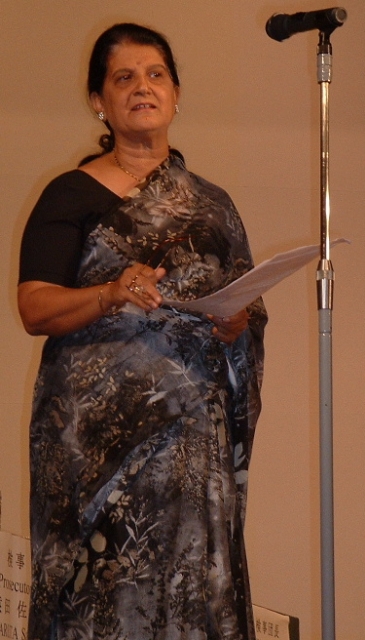IRAQIS TESTIFY AT WAR CRIMES TRIBUNAL IN JAPAN (pt. 1)
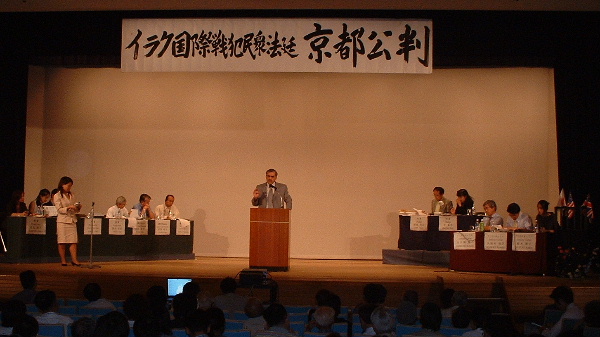
(Iraqi exile Sabah Al-Mukhtar, center, giving testimony at the International Criminal Tribunal for Iraq in Kyoto, Japan. The tribunal's panel of public prosecutors are shown on the left side of the stage, an "amicus curiae" defense team on the right side, and two presiding judges at upper right.)
Iraq is Far Worse Now Than Under Saddam Hussein,
Iraqis Testify at War Crimes Tribunal in Japan
(part 1)
By Brian Covert
Independent Journalist
KYOTO, JAPAN — On the downtown streets of this ancient city, camera-clad tourists and foreigners wearing traditional Japanese kimono robes fluttered about the sidewalks in anticipation of the Gion Matsuri, one of Japan’s biggest annual summer festivals. Inside a building located on the parade route that day, however, an equally international cast of characters gathered for a slightly more serious occasion: indicting the leaders of the United States, Britain and Japan for war crimes in Iraq.
The "International Criminal Tribunal for Iraq" was held at Kyoto Silk Hall here Saturday, July 17, and Sunday, July 18, 2004, and featured direct testimony by Iraqi citizens on the state of their nation.
“I hate to say anything good about Saddam’s regime,” said Haifa Zangana, a former political prisoner from Iraq now living in London, “but regarding women, I would say it is definitely worse at the moment. Definitely worse economically and worse socially.”
An Iraqi Kurd who fled Iraq in 1975 after being tortured in prison, Zangana added: “The [U.S.-led] occupation did everything wrong to women — on every single level. We haven’t seen anything improved regarding women” in Iraq. Zangana was one of three Iraqis invited to give public testimony about Iraq to the Kyoto tribunal, organized by a Japanese organization called the Movement for Democratic Socialism and other citizens groups.
A parade of activists, journalists, academics and lawyers gave sworn (though not legally binding) testimony over the two days of the Kyoto tribunal, bearing witness to the continued suffering of the Iraqi people more than one year after the U.S.-led invasion of that country — and about one month after a U.S.-appointed Iraqi government ostensibly began taking over its nation’s own affairs.
The mock trial in Kyoto was conducted in traditional courtroom style, with presiding judges; a team of public prosecuting lawyers seeking to indict U.S. President George Bush, British Prime Minister Tony Blair and Japanese Prime Minister Junichiro Koizumi for war crimes; and a legal team supporting the three leaders in absentia.
The event was conducted in the spirit of the “people’s tribunals” organized against the Vietnam War of the 1960s by English philosopher Bertrand Russell — tribunals designed to give a voice to citizens all over the world on matters concerning genocide and war.
“We meet at this tribunal at a moment of grave crisis for the entire world,” Niloufer Bhagwat, a lawyer and vice president of the Bombay-based Indian Association of Lawyers, said in the tribunal’s opening remarks. “The world is standing on a precipice.”
“The entire system of laws and rules which we created out of the ashes of more than 50 million dead in the Second World War, the entire international legal system, has collapsed,” she said. Baghwat said the global financial system has also since been overturned by a shady network of corporations around the world, especially in the U.S. This kind of tribunal, she said, will expose and hold accountable the mega-corporate criminals.
“This is the beginning. One day, and very soon, there will be a trial,” said Baghwat. “This is the preparation for that trial, when the so-called enterprises and corporates which are behind the political masks operating from government to government will be tried and will get what they deserve.”
Baghwat also served as judge in a similar tribunal, the International Criminal Tribunal for Afghanistan (ICTA) in Tokyo in March 2004, which indicted U.S. president Bush for crimes of aggression against the Afghan people.
The evidence offered and testimony given at the two-day Kyoto tribunal on Iraq focused on five main areas: the U.S.-led attack on Iraq; the occupation of Iraq; the torture of Iraqi detainees at Abu Ghraib prison and elsewhere; the U.S. massacre of civilians in the town of Fallujah; and the crimes of Japanese prime minister Koizumi, who is accused of “aiding and abetting” the U.S. and U.K. in Iraq.
In his opening summary of the tribunal’s indictment, Romeo T. Capulong, chief of the tribunal’s public prosecution team, said he intended to “introduce evidence beyond any doubt that U.S. President George W. Bush is a war criminal of the worst type….”
“International law experts, human rights activists, anti-war protesters and peace advocates, as well as the larger international community, agree that the U.S.-led invasion and occupation of Iraq once again highlight the current and continuing problems that confront — if not threaten — the very survival of the human race in this planet,” said Capulong, a leading human rights lawyer from the Philippines. The International Criminal Tribunal for Iraq, he said, had a moral obligation to stand up for the many victims around the world “whose lives have been degraded by superpower unilateralism and domination, and an unjust social order.” He included among those victims “the broader American people, who suffer because of an expensive war in terms of social benefits and services that are sacrificed and denied to them.”
Akio Sugeno, a Japanese attorney and deputy chief of the prosecutors’ team, said that “….the Iraq war is almost tantamount to Hitler’s ambition of global rule. ....We need to try him [Bush] for these crimes.”
The tribunal noted that Bush, Blair and Koizumi had all been officially summoned to the Kyoto hearing through government channels. Since the three leaders had not shown up at the tribunal, a team of amicus curiae (“friend of the court”) lawyers was appointed to support the three leaders’ actions in absentia, as well as to “deepen” the arguments that the three leaders themselves had made concerning the invasion and occupation of Iraq.
“We cannot easily label them as criminals,” Japanese attorney Kenichi Ohkubo, head of the amicus curiae team, said of Bush, Blair and Koizumi. “If they are criminals, then the voters who elected them and the legal systems in each country are also criminal in nature.” The defense side also questioned the legitimacy of this kind of public tribunal, saying that it had no legal standing in the international justice system.
Organizers estimated that 1,100 people attended the tribunal over the two days it was held in Kyoto.
The Kyoto tribunal is one in a series of ICTI hearings being held throughout Japan, following the drafting of the ICTI statute in July 2003. A similar tribunal in this part of Japan was held in Kobe, Japan in May.
By far, the most powerful testimony in Kyoto came from the three Iraqi citizens, who, like all other witnesses at the tribunal, testified under oath.
Sabah al-Mukhtar, an Iraqi attorney living in exile in London, challenged the idea that the United States invaded Iraqi to free its people from Saddam Hussein. “How can a foreigner liberate a national? An American cannot liberate an Iraqi from an Iraqi,” he said. “Liberation is a concept that when there is an occupied territory by foreigners, then you liberate the country. But when we turn logic upside-down, and we start saying that the Americans can liberate Iraq, one has to ask: ‘Liberate Iraq from whom? Liberate it from the Iraqis?’”
If Iraqis have been freed, al-Mukhtar said, it has been at the expense of their own lives: “Tens of thousands of Iraqis have already been ‘liberated’ [from] life; they have been killed. That is the liberation we are talking about.”
Al-Mukhtar, president of the London-based Arab Lawyers Network, said that the human rights violations now occurring under the U.S. military forces in Iraq are as bad, if not worse, as those that took place under the regime of Saddam Hussein. “The human rights abuses during the regime of Saddam were reported. But the human rights abuses now — we have seen them on film,” he said. “We’ve seen what’s been happening to Abu Ghraib [prison], we know that there are tens of thousands of Iraqis who have not been put to trial. There are today in Iraq at least 10,000 people who are detained without a trial; they have not seen a lawyer, they have not been charged, they have not been put before a court. This is a fact.”
Capulong, the Filipino chief of the Kyoto tribunal’s prosecution team, asked al-Mukhtar why he thought the U.S. had invaded Iraq in the first place.
”I think the objective of the war, the real objective, is to redraw the map [of the Middle East], number one. And to control the oil, number two,” replied al-Mukhtar, a former legal advisor to the Iraqi National Oil Co. “And thirdly is to impose the new American era on the world. So for instance, in Saudi Arabia, from now on, if they want to teach the Quran, it has to be taught in the way that the Americans accept it. You have to leave [out] some chapters and some verses from the Quran because it doesn’t suit them.”
He cited as evidence the policy of the U.S. “new conservatism movement” affiliated with the Project for the New American Century, who, he said, “have planned these moves and planned these actions way before 2003.”
He said the future of countries like Japan that formerly depended heavily on the Arab world for oil is now a precarious one. “The Americans have the oil, but that is not enough. What is wanted is to control the oil that goes to others. And this country [Japan] is one of the countries that is absolutely on the receiving end,” he said. “….I’m an oil man, I used to work for the oil industry,” added al-Mukhtar. “I have a lot of contacts, and a lot of respect and a lot of relationships with Japan. And I know the relationship between Japan and the Arab world. That relationship is now being dramatically changed.”
So chaotic is the situation in Iraq, said al-Mukhtar, that “at the present moment, I think if I go to Iraq, probably I will not come out alive again.”
On the issue of the systematic torture at Abu Ghraib prison in Iraq, South Korean lawyer Cha Ji-Hoon, serving on the prosecution team, said that Bush must be held responsible for such acts.
“President Bush has the power and authority over all U.S. forces as the supreme commander,” Cha said. “However, he has never taken any measures to prevent or stop this torture. Therefore, President Bush as the military commander is responsible for the abovementioned war crimes and crimes against humanity.”
In Bush’s defense, Ryosuke Kuboki, a lawyer from Tokyo serving on the amicus curiae team, said that the U.S.-led invasion of Iraq could not be helped, given the country’s weak position under a deadly dictator. “In Iraq, [Saddam] Hussein, as a resilient dictator, imposed a terror regime for years,” Kuboki said. “The Iraqi people had no power to emancipate themselves from such oppression. So to free them from certain oppression, they needed external forces — and those were the U.S. and U.K. forces.”
Summing up the first day’s defense arguments, Kuboki said history would prove the U.S. correct in its policy on Iraq: “I would like to emphasize that for a society to be reborn, there is inevitably labor pains that a society needs to suffer. And this is something that all of us need to recognize as the truth as we look back upon history.”
The stage was thus contentiously set for Day Two of the International Criminal Tribunal for Iraq in Kyoto, Japan.
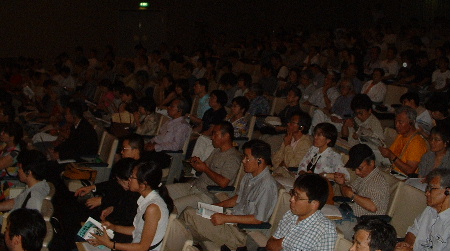
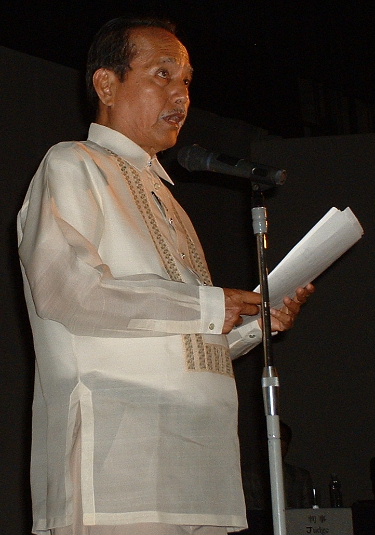
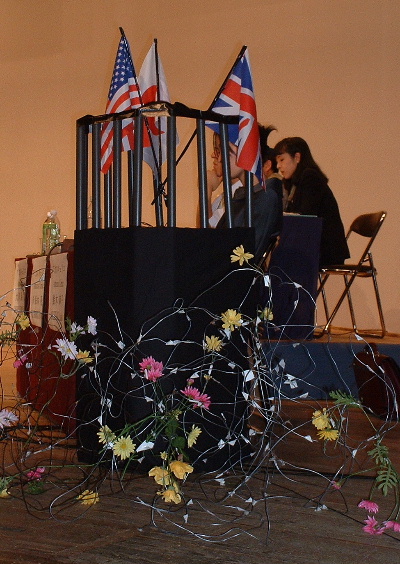
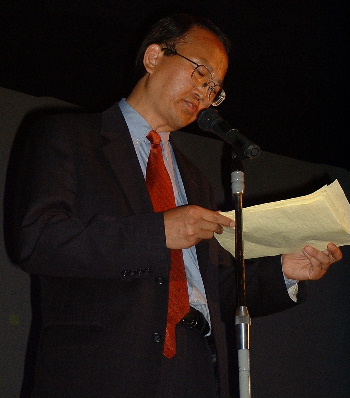
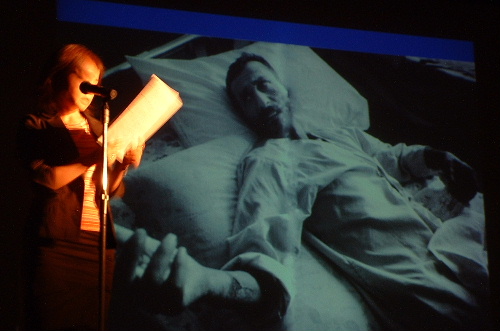
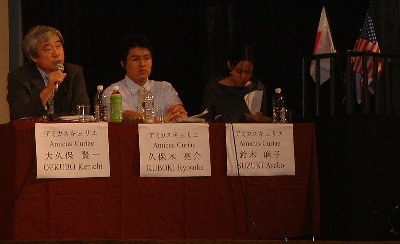
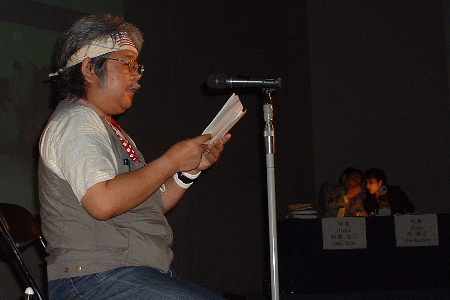
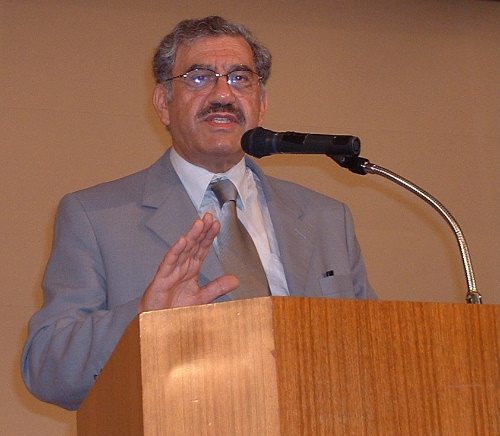
Get Involved
If you'd like to help with maintaining or developing the website, contact us.
Publish
Publish your stories and upcoming events on Indybay.


